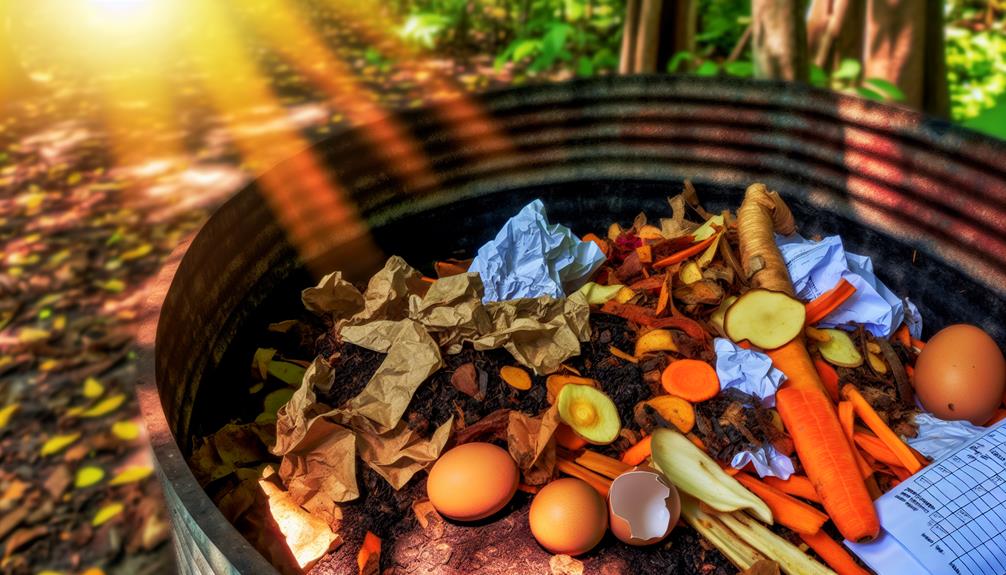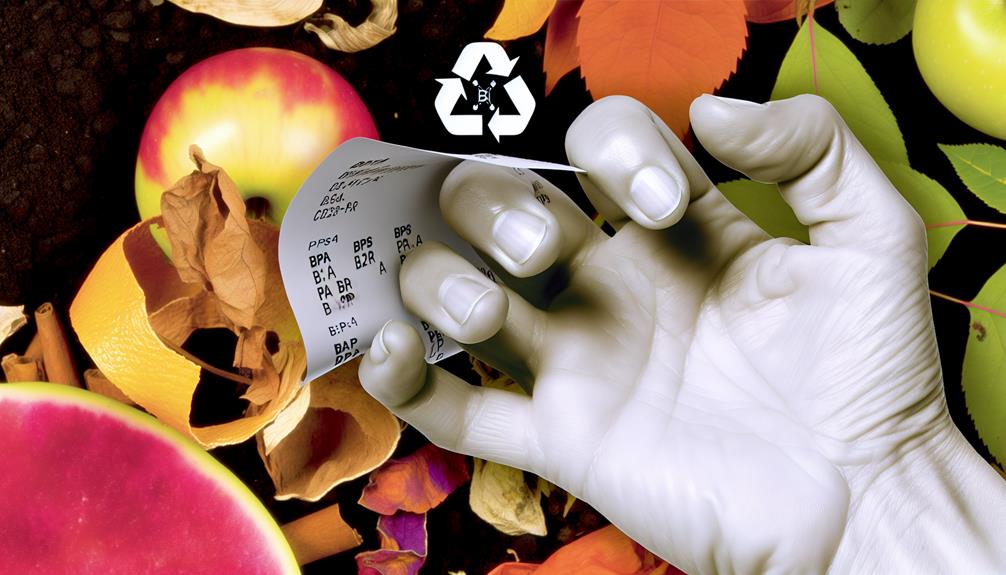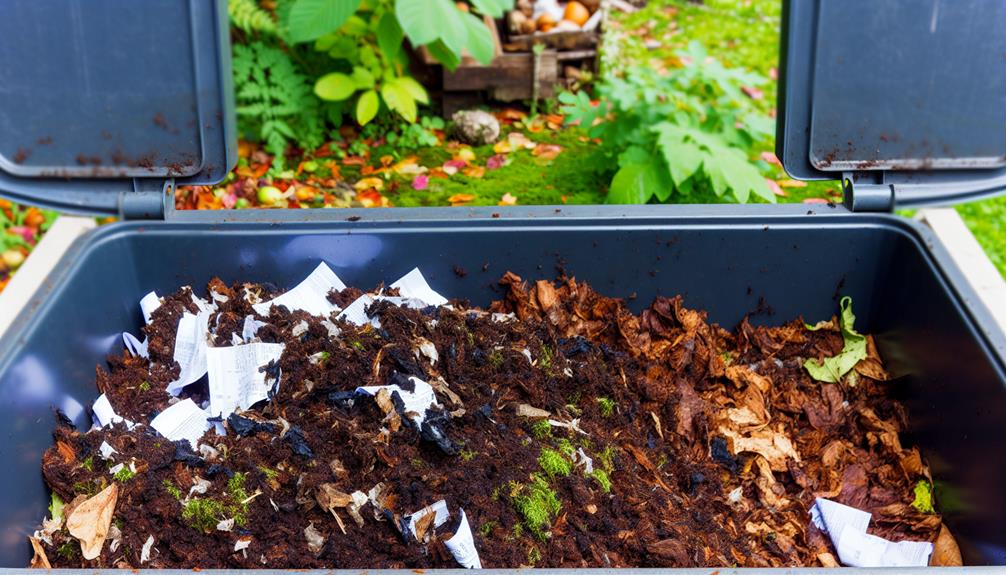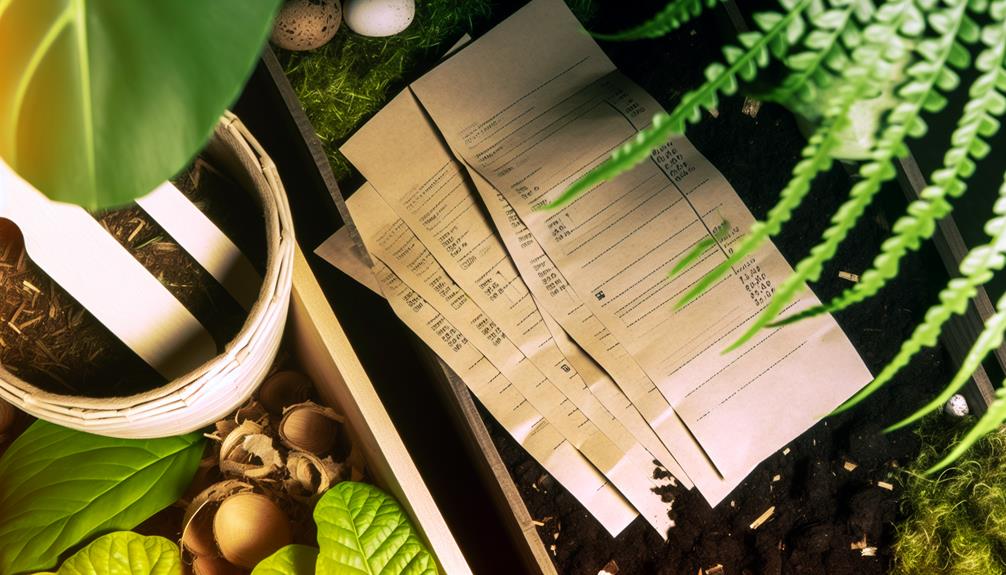

You can compost certain types of receipts, but it’s important to know the difference. Regular paper receipts without chemicals like BPA and BPS are safe for composting. However, thermal paper receipts, often glossy or waxy, can contain harmful chemicals unsuitable for compost. Instead, recycle thermal paper if accepted by local programs.
For better composting results, shred safe receipts and mix them with other compostable materials. Opt for digital receipts when possible to reduce waste and avoid potential chemical exposure. If you continue, you’ll discover more practical steps for managing receipt waste sustainably.
When it comes to composting receipts, it’s important to understand the different types of receipt paper you might encounter. Not all receipt papers are created equal, and knowing the differences can help you determine whether a receipt can go into your compost bin.
Generally, receipts fall into two main categories: those printed with traditional ink and those with a special paper coating. Traditional ink types are found on receipts printed with standard inkjet or laser printers. These receipts are usually made from plain paper without any special coatings. If you have receipts printed with traditional ink, they’re more likely to be safe for your compost pile, as the ink typically doesn’t contain harmful chemicals that could disrupt your composting process.
On the other hand, some receipts come with a paper coating that makes them less compostable. This coating can be made from various materials designed to make the paper more durable or resistant to smudging. These coated papers often contain chemicals that aren’t suitable for composting, as they mightn’t break down properly and could introduce unwanted substances into your compost. Always check for a glossy or waxy surface to identify these receipts.
Also Read: Can You Compost Ice Cream?
Thermal paper, commonly used for receipts, relies on heat-sensitive chemicals to produce text and images. When you think about thermal printing, imagine a special paper that changes color when exposed to heat. No ink is needed; instead, the printer uses heat to create the images and text. This is why thermal printers are often found in places like stores and ATMs—they’re fast and efficient.
The secret behind thermal paper lies in its paper coatings. These coatings contain a mix of chemicals that react to heat. When the thermal printer heats specific areas of the paper, the coating changes color, resulting in the printed text or images. It’s a clever and convenient method, but it also means the paper is quite different from regular paper.
Understanding this difference is crucial if you’re considering composting receipts. Thermal paper’s unique composition and coatings can affect how it breaks down in a compost pile. Some of these chemicals mightn’t be ideal for your compost, so you need to be aware of what you’re adding to your pile.
Also Read: Can You Compost Mail?
One major concern with composting thermal paper receipts is their potential to contain harmful chemicals like BPA and BPS. These substances are endocrine disruptors, meaning they can interfere with your body’s hormonal systems.

When you compost receipts containing BPA or BPS, these chemicals can leach into the soil, posing significant health risks to both you and the environment.
BPA (Bisphenol A) and BPS (Bisphenol S) are used to coat thermal paper, making it reactive to heat for printing. However, these chemicals can transfer from receipts to your skin and other surfaces, even before they reach your compost pile.
Over time, continuous exposure to BPA and BPS can lead to various health problems, including reproductive issues and increased risk of certain cancers.
To minimize these health risks, it’s important to identify whether your receipts contain BPA or BPS. Many companies are now labeling receipts as ‘BPA-free‘ or ‘BPS-free,’ but it’s advisable to remain cautious.
If you’re unsure, it’s safer to avoid composting any thermal paper receipts. By taking these precautions, you contribute to a healthier environment and protect yourself from potential endocrine disruptors.
Also Read: Can You Compost Rust?
Fortunately, there are several alternatives to thermal paper that can help you reduce your exposure to harmful chemicals like BPA and BPS. One option is to use digital receipts. Many businesses now offer to send receipts via email or text message, which eliminates the need for paper altogether. Not only is this a convenient solution, but it also reduces waste and is environmentally friendly.
Another sustainable option is switching to plain paper receipts. These are typically made from standard paper without chemical coatings, making them easier to dispose of or recycle. Some companies even use biodegradable alternatives, such as paper made from recycled materials or other eco-friendly sources. These types of paper decompose more easily and have a lower environmental impact.
You can also encourage your favorite stores and restaurants to adopt these sustainable options. By supporting businesses that prioritize eco-friendly practices, you help create a demand for safer and more sustainable receipt options. Together, these small changes can make a substantial difference.
Switching to plain paper receipts not only reduces harmful chemical exposure but also opens up the possibility of composting them. Unlike thermal paper receipts, regular paper receipts don’t contain BPA or BPS, making them safer for your composting process. You can confidently add these receipts to your compost bin, knowing they’ll break down naturally over time.

To start, make sure the receipts are shredded or torn into smaller pieces. This accelerates paper decomposition by increasing the surface area for microorganisms to work on. Mix the shredded receipts with other compostable materials like kitchen scraps, yard waste, and cardboard. Keep a balanced ratio of green (nitrogen-rich) and brown (carbon-rich) materials to maintain an effective composting process.
Ensure your compost pile stays moist but not waterlogged, and turn it regularly to introduce oxygen. This helps speed up the paper decomposition and prevents any foul odors.
If managed correctly, the paper receipts will break down along with the other organic matter, enriching your compost. Remember, composting is a community effort towards sustainability, and every small step, like composting regular paper receipts, makes a difference.
Also Read: Can You Compost Carrot Peel?
When you think about receipts, it’s crucial to recognize their environmental impact. They often contain toxic chemicals like BPA and BPS, which aren’t good for composting or recycling.
Additionally, the sheer volume of paper waste from receipts contributes considerably to landfills, creating a pressing need for more sustainable alternatives.
Receipts often contain toxic chemicals like Bisphenol A (BPA) and Bisphenol S (BPS), which pose significant environmental hazards. These chemicals aren’t just harmful to the environment but also present health risks to you. When you handle receipts, you’re exposed to these chemicals, which can seep into your skin and enter your bloodstream.
Frequent chemical exposure, even in small amounts, can lead to serious health issues over time, such as hormonal imbalances and reproductive problems.
To reduce your exposure, minimize handling receipts and wash your hands afterwards. Opt for digital receipts when possible; many stores now offer this eco-friendly option.
If you’re involved in composting, avoid adding receipts to your compost pile. BPA and BPS don’t break down easily, and they can contaminate your compost, making it unsafe for garden use.
Look for BPA-free receipts, often marked as such, but remember that BPS is sometimes used as a substitute and can be equally harmful.
Every year, billions of paper receipts end up in landfills, adding substantially to paper waste and environmental degradation. This accumulation of receipts takes up valuable landfill space, which could be better used for non-recyclable materials. By understanding the impact of receipts on landfills, you can take steps to reduce waste and make more environmentally conscious decisions.
Here are a few key points to take into account:
You can play an essential role in waste reduction by choosing digital receipts whenever possible. This small change helps conserve landfill space and reduces the demand for paper production.
Every action counts, and together, we can make a significant impact on the environment by being mindful of our paper waste.
While both recycling and composting offer environmental benefits, understanding their differences helps you make more informed choices.
Recycling processes involve collecting, sorting, and processing materials to create new products. This reduces the need for raw materials and decreases energy consumption. Items like glass, metal, and certain plastics are ideal for recycling.
On the other hand, composting benefits the environment by turning organic waste into nutrient-rich soil. This process involves the biological decomposition of organic matter, such as food scraps and yard waste, which helps reduce landfill waste and enriches soil for gardening and agriculture.
When deciding whether to recycle or compost an item, consider its material composition. Paper receipts, for example, often contain BPA or BPS chemicals, making them unsuitable for composting. These chemicals can contaminate your compost and harm beneficial microorganisms. Instead, opt to recycle them if your local recycling program accepts thermal paper.
To reduce receipt waste, start by opting for digital receipts whenever possible. Many stores and restaurants now offer this option, which minimizes paper use and clutter.
Additionally, don’t hesitate to decline unnecessary receipts, especially for small purchases where you don’t need a record.
Switching to digital receipts is a simple yet effective way to cut down on paper waste and reduce your environmental footprint. Embracing electronic receipts offers numerous digital benefits, making your life easier while contributing to a more sustainable planet.
You’ll find that opting for digital receipts can streamline your record-keeping, enhance your organization, and reduce clutter in your home.
When you choose electronic receipts, you’re not just helping the environment; you’re also joining a growing community committed to sustainable living. Here are some practical steps to make the switch:
By simply declining unnecessary receipts at checkout, you can noticeably reduce paper waste and contribute to a greener environment. Making small adjustments to your consumer habits can make a big difference. When shopping, always consider your receipt preferences. Ask yourself if you really need that printed slip for every purchase.
Most stores now offer digital receipts, which aren’t only convenient but also environmentally friendly. When given the option, choose an email or text receipt instead. This simple switch can markedly cut down on the amount of paper you use.
Additionally, some receipts are printed on thermal paper, which contains chemicals that aren’t compostable. By opting out of these, you avoid adding non-biodegradable waste to the environment.
Another effective strategy is to politely inform cashiers that you don’t need a receipt for small or everyday purchases. Over time, this can become a habit that reduces your personal paper trail. It’s a straightforward way to align your receipt preferences with sustainable consumer habits.
Also Read: Can You Compost Cardboard?
Incorporating eco-friendly receipt options can significantly reduce waste and promote sustainability in your daily transactions. One effective way to do this is by using biodegradable receipts. These receipts break down naturally, causing less harm to the environment.

Additionally, opting for receipts printed with sustainable inks, which are derived from renewable resources and non-toxic materials, further strengthens your commitment to eco-friendly practices.
Here are some practical steps you can take to switch to eco-friendly receipt options:
Thermal receipts can harm soil health when composted. They contain chemicals that disrupt soil microbes, affecting their ability to aid nutrient absorption. For a healthier garden, avoid composting these receipts and protect your soil community.
You might be concerned about indoor air quality when composting receipts. If receipts contain BPA or BPS, they can undergo chemical leaching, potentially releasing harmful chemicals into the air, impacting the environment we all share.
You can safely break down thermal paper receipts for composting by using thermal de-inking or enzyme treatment. These methods help remove harmful chemicals, making your compost safer and ensuring you’re part of an eco-friendly community.
If you add BPA-contaminated receipts to your compost, you risk soil toxicity. This can harm your garden and disrupt the community’s efforts to maintain a safe, healthy environment. Stick to composting safe materials!
You can help businesses shift to more eco-friendly receipt options by encouraging the use of digital receipts. Embrace eco friendly alternatives together, reducing paper waste and creating a community committed to sustainability and a healthier planet.
Now that you understand the types of receipt paper and the concerns around thermal paper, you can make informed choices.
Compost regular paper receipts, but avoid those with BPA and BPS.
Consider eco-friendly alternatives and focus on reducing receipt waste by opting for digital options.
Recycling is often a better choice for thermal paper.
By making these small changes, you’ll contribute to less environmental impact and a more sustainable future.
